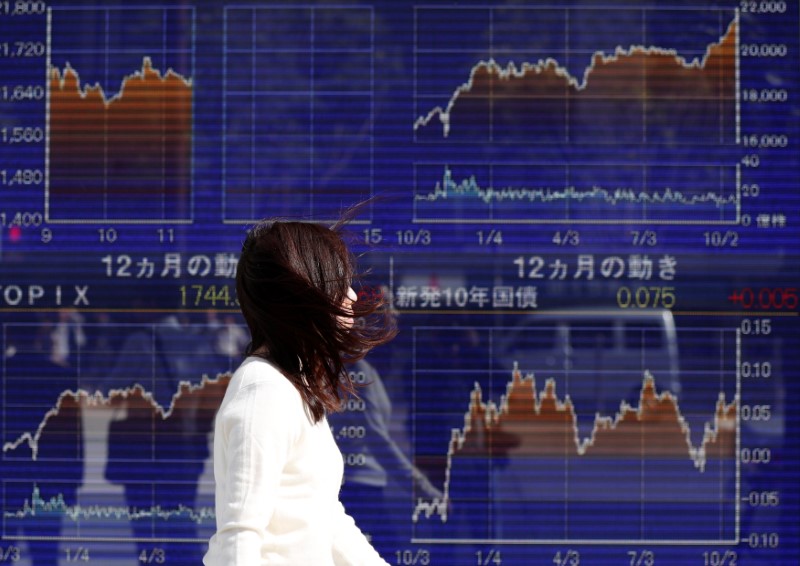By Hideyuki Sano
TOKYO (Reuters) - Stocks rose on Monday after U.S. Treasury Secretary Steven Mnuchin declared the U.S.-China trade war "on hold" following their agreement to suspend the tariff threats that roiled global markets this year.
U.S. S&P mini futures (ESc1) rose 0.60 percent in Asian trade on Monday. European stocks are expected to follow suit, with spread-betters seeing a higher opening of 0.7 percent in Britain's FTSE (FTSE) and 0.4 percent in Germany's DAX (GDAXI) and France's CAC (FCHI).
MSCI's broadest index of Asia-Pacific shares outside Japan (MIAPJ0000PUS) advanced 0.45 percent, led by strong gains in greater China. Hong Kong's Hang Seng (HSI) was up 1.3 percent, Taiwanese shares (TWII) 1.3 percent.
The Shanghai Shenzen CSI 300 (CSI300) gained 0.7 percent, hitting five-week highs.
Japan's Nikkei (N225) gained 0.4 percent.
Mnuchin and U.S. President Donald Trump's top economic adviser, Larry Kudlow, said the agreement reached by Chinese and American negotiators on Saturday set up a framework for addressing trade imbalances in the future.
"The weekend talks appear to have made progress. While they still need to work out details of a wider trade deal, it is positive for markets that they struck a truce," said Hirokazu Kabeya, chief global strategist at Daiwa Securities.
As safe-haven demand for debt fell, U.S. bond prices were under pressure, keeping their yields not far from last week's peaks.
The 10-year Treasuries yield stood at 3.076 percent (US10YT=RR), near a seven-year high of 3.128 percent hit on Friday.
"Recent data suggests the U.S. economy is very strong, hardly slowing down in Jan-Mar. The world economy slowed in that quarter but it appears to be rebounding. And recent rises in oil prices are likely to lift inflation expectations further," said Tomoaki Shishido, senior fixed income analyst at Nomura Securities.
"We expect more selling until the next Fed's meeting in June," he said.
In the currency market, higher U.S. yields helped to strengthen the dollar against a wide range of currencies.
The euro dipped 0.2 percent to $1.1748 (EUR=), hitting its lowest level since mid-December.
The common currency was also hit after two anti-establishment parties pledged to increase spending in a deal to form a new coalition government in Italy.
The dollar maintained an uptrend against the yen, rising 0.5 percent to 110.29 yen,
Some emerging market currencies remained fragile. The Indonesian rupiah
Oil prices held firm near 3-1/2-year highs, drawing support from easing trade tensions between the world's two biggest economies.
The market is keeping an eye on Venezuela, where President Nicolas Maduro won a new six-year term, an outcome that could trigger additional sanctions from the United States and more censure from the European Union and Latin America.
Oil prices have been supported by plummeting Venezuelan production, in addition to a solid global demand and supply concerns stemming from tensions in the Middle East.
U.S. crude futures rose 0.8 percent to (CLc1) $71.83 per barrel, near last week's 3 1/2-year high of $72.30 while Brent crude futures (LCOc1) notched up 0.8 percent to $79.10 per barrel. It had risen to $80.50 last week, its highest since November 2014.
Venezuelan debt is barely traded in Asia but bonds issued by Venezuelan oil company PDVSA maturing in 2020

Elsewhere U.S. soybeans